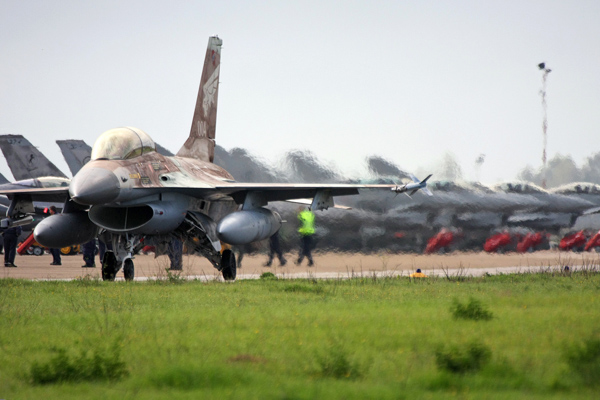Well-informed sources in Israel’s administration and intelligence service anticipate the possibility of an Israeli military strike against Iranian nuclear facilities with high probability during the U.S. elections. General Amos Yadlin, Head of the Institute for National Security Studies, talks in an exclusive interview about the conflict with Iran and Israel’s options.
There is an imminent danger of a war between Israel and Iran. “If you haven’t managed to persuade Teheran in nine years, you will not succeed in the tenth. Iranians are only playing for time until their country has “the nuclear option,” says a senior Israeli diplomat. A result could be a new war in the Middle East.
Rafael Seligmann spoke with the former head of the Israeli Air Force and later head of the Military Intelligence, General Amos Yadlin, who explains Israel’s political strategy.
You were one of the eight fighter pilots who attacked the Iraqi nuclear power-plant Osirak 1981. What did you feel the moment when it was destroyed?
At that time, I was a young fighter pilot and it was a professional challenge to reach such a long-range target successfully and to destroy a nuclear reactor for the first time in history. As a fighter pilot, you concentrate on the tactical challenges. The fueling – having enough fuel to go and to come back –, surviving the surface-to-air-missiles (the SAM-missiles), the anti-aircraft-artillery, to be able to identify the target, to hit the target, to come back safely: these were tactical achievements. Now in the perspective of more than thirty years, you see the strategic importance of such a mission.
There seem to be three possibilities: First of all, the Iranians attain the nuclear weapon, second, they give in to sanctions, and third, they don’t decide. Now it looks as though they are very near to attaining their nuclear goal.
The Iranian strategy is that they can break out for the bomb immediately, which is not the strategy today. On the other hand, they can decide to come to an agreement with the international community not to develop nuclear weapons, give reassurances and allow inspections to make sure that this is a reliable promise.
But they can choose a third option – and that is basically what they are doing: To continue and work on the nuclear infrastructure that enables them in the future to develop the bomb in a very short time. Teheran’s strategy is not to attain a nuclear bomb as fast as possible, it is rather to be able to decide to have the ovption on a nuclear bomb at any moment, and to go to that bomb as safely as possible. Which means developing nuclear infrastructure on many tracks – plutonium, reactors, centrifuges, uranium enrichment – very broad, very redundant. A lot of sites have all the components ready for the decision.
What’s their present situation?
One option is to decide to go the last mile, because they have already gone 90 percent of the way to the bomb. They have the capability to enrich, they have a nuclear reactor, they enrich to twenty percent, they have enriched enough low uranium for six or seven bombs, they have enough centrifuges to enrich the last mile to military grade, they have missiles, they deny having a weapon group developing the weapon.
So they have all the ingredients ready, they haven’t decided on the last mile but they are there. If they decide tonight, it’s a matter of a year. If the infrastructure gets even bigger as they are advancing – more and more centrifuges, more and more fossil materials – it can be sooner. And this is their goal: to be able to break out in a very short time. But they can choose to remain on the threshold for a couple of years.
What should Israel do now?
Israel basically also has three options. First is to live with a nuclear Iran. Second is to bomb Iran. Both options are risky – there are negative consequences to both. A nuclear Iran is unacceptable, to give the ultimate weapon to those who call for Israel’s destruction. Israel cannot allow this. If Iran is bombed, there are the consequences of an Iranian retaliation. According to General Dagan, the former commander of the Mossad, this might mean a regional war, though I don’t think so. Of course the Iranians will retaliate, they will not be taken by surprise. They have been waiting for this attack for the last couple of years.
Can Israel really prove that Iran is on the way to build the bomb?
The Iranian cover story is that this is a civilian program and it’s their right since they are signatory to the NPT. However, Iran was caught red-handed with activities that cannot be reconciled with their obligations to the NPT. I have no doubt what they are aiming for. They will go to the bomb when they strategically think that it will not provoke a reaction against them, when the international community does not have the will to deal with it. This will be the moment they decide to proceed on the bomb.
Should Israel attack Iran in such a situation, even without the support of the US?
According to the formal de-claration of the president of the United States last year, he is committed to preventing Iran from becoming nuclear. He does not accept the strategy of containment. Israel and the United States are in agreement on the strategic goal. The argument is: The Americans want to wait for the ‘last mile’. But how can they be sure that they´ll have the information when Iran is walking that last mile? And will they be able to stop them due to the very broad and redundant nuclear industry? Now they have a limited number of sites. If Iran is allowed to continue and develop their nuclear program, their industry will be too big to stop. Israel is saying: Don’t let them develop the capability to break out; the Americans are saying: Whenever they actually go for the bomb, we will do what we have to do.
Is Israel able to attack Iran alone?
Sure. Israel can do it alone. But attacking Iran is not our goal. Our goal is to stop Iran having nuclear weapons. And here you have to think beyond the one-time-attack. On this Israel cannot go it alone. So Israel can achieve the goals of a tactical attack. But for the strategy, to not allow this regime in Iran to have the bomb, Israel needs the international community. And it’s not an Israeli problem. It’s an international problem. A nuclear Iran is more dangerous to the Arab world than to Israel. It is dangerous for Europe, it is dangerous for the stability in the Middle East, it is dangerous to Russia with all its Muslim minorities, so I see that it’s a mistake that Israel took the lead on Iran. Iran is a much broader problem for the world than only for Israel.
What about Europe’s position?
The Europeans are now leading the effort to sanction Iran, even ahead of the United States. I think that Europe is more aware of the Iranian threat now, when it is coping with Islamic problems, and when Iran has missiles that can reach Europe. And even from a selfish price-of-oil-issue, I heard from some European friends that they are more worried that a nuclear Iran will manipulate the price of oil – basically take it up and leave it there – than about a military intervention which will put the price of oil up but immediately after it will fall to the market level of today. Because a nuclear Iran can really monopolize and manipulate the price of oil to levels it never had before.
Is there also a danger of proliferation in the case of Saudi Arabia and Turkey?
Absolutely. I think one of the dangers of a nuclear Iran is the nuclearization of the rest of the regional superpowers. The Saudis declared that they will not stand by idly. I think they have all the money in the world, they have all the political incentive, and the technology can be obtained from a very close ally – Pakistan. Turkey and Egypt are also candidates for that.
This is going to be an international nuclear nightmare. This is the collapse of the NPT Regime. I think the Europeans understand this; that’s why they are leading the sanctions against Iran.
Is there a fear of an immediate Israeli attack?
If we listen to the public declarations of the Israeli prime minister and defense minister, the chances for an attack are not low, because all the boxes were checked. Sanctions are not effective, negotiations have failed. A covert operation, which nobody took responsibility for, is not achieving the goal of stopping Iran. The regime has not changed. If you do not accept a nuclear Iran, and this is the position of the prime minister of Israel, and if you take seriously the argument about a zone of immunity, which the Iranians will very soon be in, this is the time-window for action.
As I say, it now depends on how much the dialogue between America and Israel can convince Israel that first there is still a chance for diplomacy and sanctions to work.
What is your opinion: Could an attack happen in the next few months?
If there was to be an Israeli attack, it would be after our allies in the world have understood that we have given all the time needed to exhaust the other options. This legitimacy is very important in the “decade after”.
General Yadlin (61), has been Director of Tel Aviv University’s Institute for National Security Studies (INSS) since 2011. He was Head of the Military Intelligence Directorate


